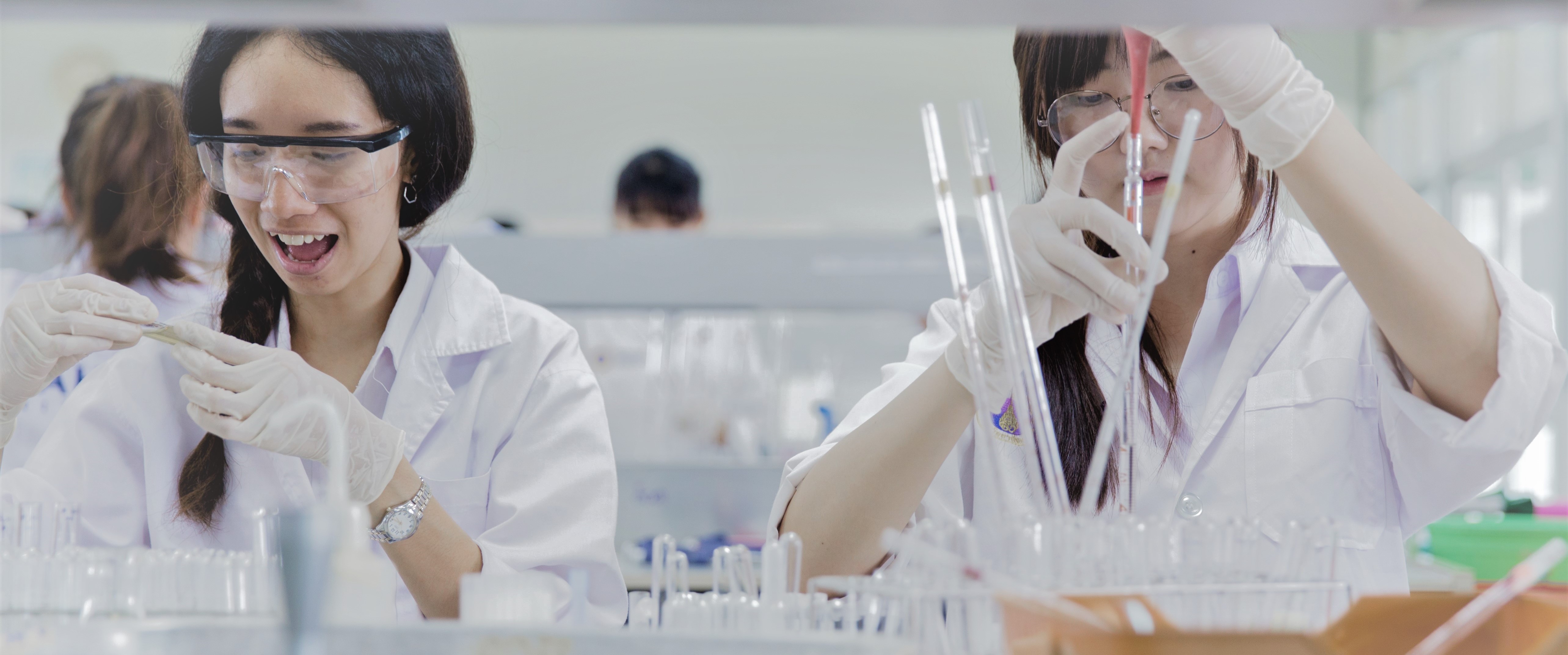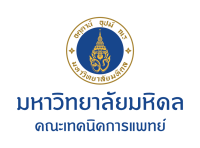
| Medical Technology Program | Radiological Technology Program | |
|---|---|---|
| Degree | Bachelor of Science (Medical Technology) | Bachelor of Science (Radiological Technology) |
| Study duration | 4 years | |
| Languages | Thai and English | |
| Academic system | Semester Basis (2 semesters and summer) | |
| Admission Requirements |
Option 1: Admission through the national university entrance examination administered by the office of Higher Education Commission, Ministry of Education
Option 2: Admission through the examination administered by Mahidol University (Direct admission) |
|
| Graduation requirements |
– Complete all study requirements by not less than 4 academic years (8 semesters) and not more than 8 academic years (16 semesters). – Complete 145 credits with the cumulative grade point average of ≥ 2.00 – Pass English examination accepted by Mahidol University – Pass the exit examination set by the program |
|
Medical Technology
Bachelor of Science in Medical Technology
The Bachelor of Science in Medical Technology degree is designed to educate and train graduates for careers in medical technology and health-related sciences with good attitude and professional ethics in order to work in clinical laboratory efficiently and also work in a health-team to improve quality of life of people and community. Following an initial program of studies in basic science, the students will specialize in a wide variety of medical technology and health-related sciences areas, including chemistry, bacteriology, immunology, mycology, virology, parasitology, hematology, clinical microscopy, transfusion medicine, molecular biology, computing, histology, pharmacology, and forensic medicine.
Objectives of the Programmes
After completion, the graduates of B.Sc. Programme will be able to
-
perform the clinical laboratory tests in the field of Medical Technology for supporting clinical diagnosis, treatment, prevention and control of diseases,
-
imply knowledge and skill in Medical Technology for career study in medical technology and related sciences,
-
apply knowledge and techniques in medical technology to science-technology and research works,
-
organize and manage a clinical laboratory work efficiently and also effectively collaborate and communicate other related units,
-
be a medical technologist with high moral and professional ethics. Besides the above objectives, the graduates of B.Sc. – M.Sc/Ph.D. distinction Programme will be able to be effective researchers for innovative research in the broad areas of medical and biological sciences.
Name of Degrees:
Bachelor of Science (Medical Technology)
Selection Method
The selected applicants must pass all examination i.e. paper, interview and physical examination. Color-blindness is prohibited.
Credit system with two semesters in an academic year.
Periods of study are 4 years for B.Sc. (Medical Technology) and 5-6 years for B.Sc. – M.Sc/Ph.D. distinction programmes.
Registration
Students must register as full-time students.
Complete all study requirements by not less than 4 academic years or 8 semesters and not more than 8 academic years or 16 semesters.
Study all courses required according to curriculum structure i.e. general education, basic and professional education and free elective courses for altogether not less than 140 credits for B.Sc (Medical Technology) with the cumulative grade point average of not less than 2.00 and 142 for B.Sc. – M.Sc/Ph.D. distinction Programmes in Medical Technology.
The number of credits required for the B.Sc Programme is 142 credits and B.Sc. – M.Sc/ Ph.D. distinction Programme is 144 credits including:
(I). General Education Courses 30 credits
(II). Required Courses 106 credits (distinction Programme in Medical Technology 108 credits)
(III). Free Elective Courses 6 credits
Collaboration with other institutes/organizations
The Faculty collaborates with academic and professional institutes within and outside Mahidol University from both government and private sectors. These collaborations cover research, guest/special lecturers; and instructors for class teaching, laboratory practice and apprenticeship.
Job Opportunities
Graduates from the B.Sc. Programme are essential to pass the professional license examination in order to work legally in a clinical laboratory of government and private hospitals. Furthermore, graduates can work in many area of research laboratories, health promotion team for a community, laboratory instrument and reagent supplier company.
These graduates can be admitted to almost all Master and Doctoral Degree Programmes in Basic Science, Medical Science, Sciences and Technology, Environmental Sciences, etc.
Graduates from B.Sc. – M.Sc/Ph.D. distinction programme, bedsides working as previously mentions, they can be researchers in both of government and private sectors.
Radiological Technology
Bachelor of Science in Radiological Technology
The Bachelor of Science in Radiological Technology degree is designed to educate and train graduates for careers in radiological technology and health-related sciences. After two years of studies in basic science, students are offered a range of subjects in radiological technology, including radiography (anatomy, pathology, positioning), radiobiology, radiotherapy, medical imaging and nuclear medicine.
Objectives of the Programme
After completion, the graduates of this programme will be able to
1. perform and control every instrument/equipment used in the area of Radiological diagnosis, Radiological therapy and Nuclear medicine correctly, effectively and safely both for oneself and others,
2. know and understand the advantages and harmful of radiation, how to measure the radiation and also radiation protection focusing in those used in medicine,
3. demonstrate good merit and professional ethics and good attitude towards profession is also emphasized,
4. manage and administrate the organization concerning the radiological technologists in radiological diagnosis, radiological therapy and nuclear medicine units properly according to the international standard,
5. have enough basic knowledge for continuing in higher education in profession or others related to radiological technology profession,
Name of degree : Bachelor of Science (Radiological Technology)
Admission Requirements
All application must hold grade 12 certificates or equivalence certificate issued by the Ministry of Education in Science programme.
Selection Method
The selected applicants must pass all examinations i.e. paper, interview and physical examination.
Academic System
Credit system with two semesters in an academic year.
Duration of Study
Period of study is 4 years for B.Sc. (Radiological Technology).
Registration
Students must register as full-time students.
Graduation Requirements
Complete all study requirements by not less than 4 academic years or 8 semesters and not more than 8 academic years or 16 semesters. Study all courses required according to curriculum structure i.e. general education, basic and professional education and free elective courses for altogether not less than 145 credits with the cumulative grade point average of not less than 2.00.
Curriculum Structure
| Total credits requirement |
145 |
credits |
| (I). General Education Courses |
30 |
credits |
| (II). Required Major Courses |
109 |
credits |
| (III). Free Elective Courses |
6 |
credits |
Collaboration with otther institutes/organizations
The Faculty collaborates with academic and professional institutes within and outside Mahidol University from both government and private sectors. These collaborations cover research, guest/special lecturers, instructors for class teaching, radiological technology practice and apprenticeship.
Curriculum Structure (Thai Version)
Course Description (Thai Version)
Job Opportunities
Graduates from the Radiological Technology Programme are essential to pass the professional license examination in order to work legally in a radiological section of government and private hospitals. Furthermore, graduates can work in many areas of researcher, instructor, professor in research/education institutes and reagent supplier companies.
Graduates can be admitted to almost all Master and Doctoral Degree programmes in Radiological Technology, Radiation Oncology, Nuclear Medicine, Medical Physics, Nuclear Technology, Medical Image, Radiological Science, Information Science etc.
For more information please contact
Dr.Lertyot Treeratanapiboon
E-mail : lertyot.tre@mahidol.ac.th
Tel: +66 2 441 4371-9 Ext. 2842, 2843 Fax: +66 2 441 4380

